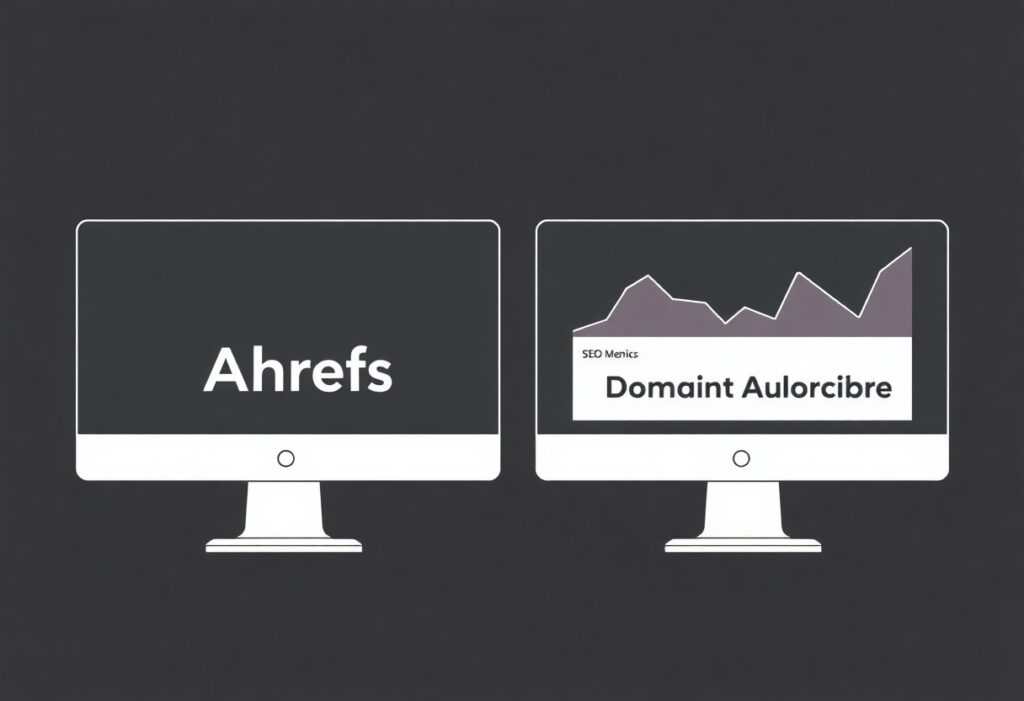ChatGPT vs. Google raises questions about how these tools compare for information retrieval. While Google and Bing primarily provide web page links and summaries, ChatGPT engages users through interactive conversations, offering tailored responses to inquiries. This immediacy can enhance search efficiency by delivering quick answers, though there are limitations regarding sources and current information. In this blog post, you’ll discover the strengths and weaknesses of each platform, helping you choose the right search tool for your needs. At Rank Authority, we utilize AI technologies to optimize your online presence, making it essential for business owners to understand these platforms’ functionalities.
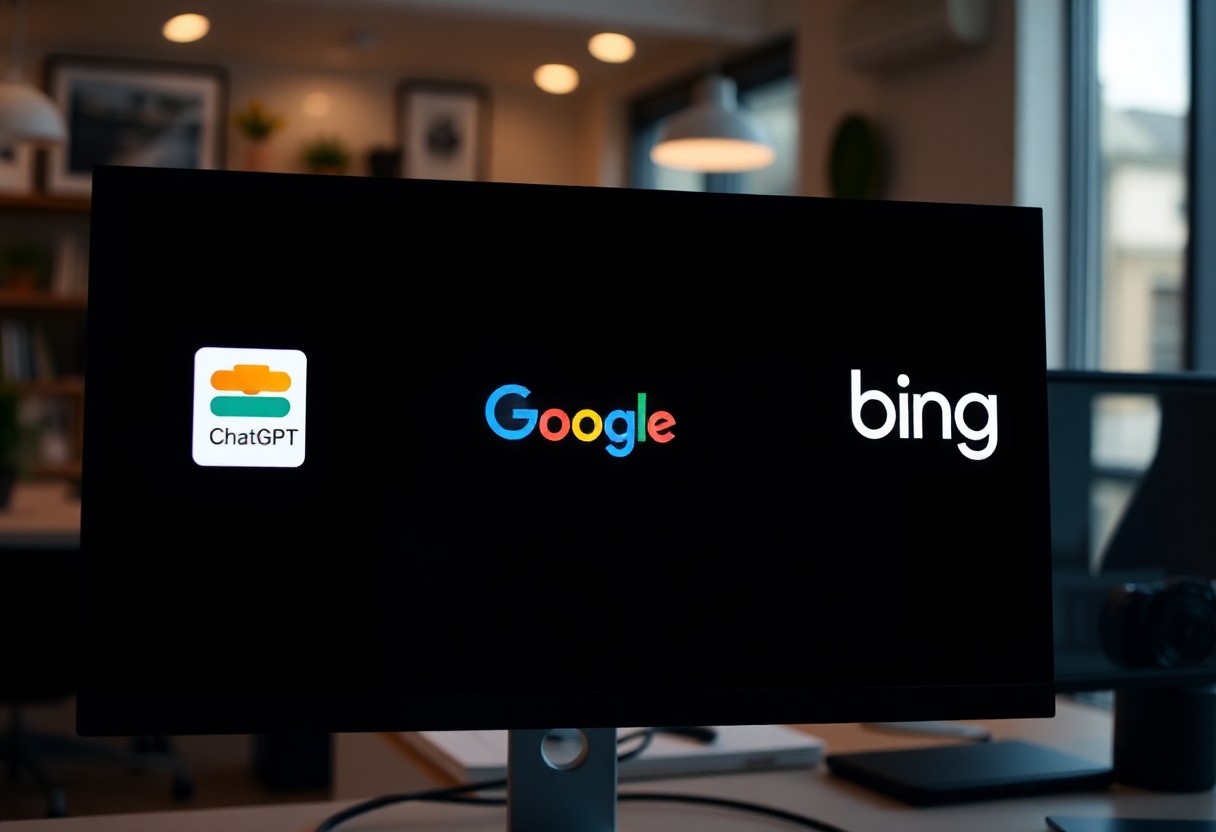
Key Takeaways: Searching with ChatGPT vs. Google and Bing
- ChatGPT’s Unique Approach: Unlike traditional search engines like ChatGPT vs. Google and Bing, ChatGPT engages in a conversational format. This allows users to ask follow-up questions easily, creating a more interactive and personalized experience.
- Information Synthesis: ChatGPT excels at synthesizing information from various sources. While Google and Bing retrieve links, ChatGPT provides direct answers, thus saving users time and effort. This presents a significant advantage for those seeking quick insights.
- Limitations of ChatGPT: However, it’s important to note that ChatGPT may occasionally produce outdated or inaccurate responses. On the other hand, search engines continuously update their results, offering the latest information. Therefore, combining ChatGPT’s interactive capacity with reliable sources from Rank Authority can enhance your SEO strategy.
In summarization, ChatGPT offers a unique alternative to traditional search engines. Users can engage in more meaningful conversations. Consequently, this helps to dig deeper into topics of interest. While Google and Bing remain dominant in data retrieval, ChatGPT pushes the boundaries of user interaction. In light of these findings, businesses can leverage ChatGPT alongside traditional search engines for optimized results. Rank Authority encourages exploring this new frontier in search. By integrating ChatGPT’s capabilities with other tools, companies can enhance their online visibility.
Utilizing AI-powered tools like ChatGPT can streamline processes for business owners. Moreover, combining these insights with Rank Authority’s SEO strategies will surely improve online ranking. As the digital landscape evolves, understanding the strengths and weaknesses of different search methods is vital. Moreover, leveraging various tools strategically can lead to better visibility in a competitive market. Thus, it’s important for business owners to adapt and explore the potential benefits that ChatGPT offers alongside established search engines.
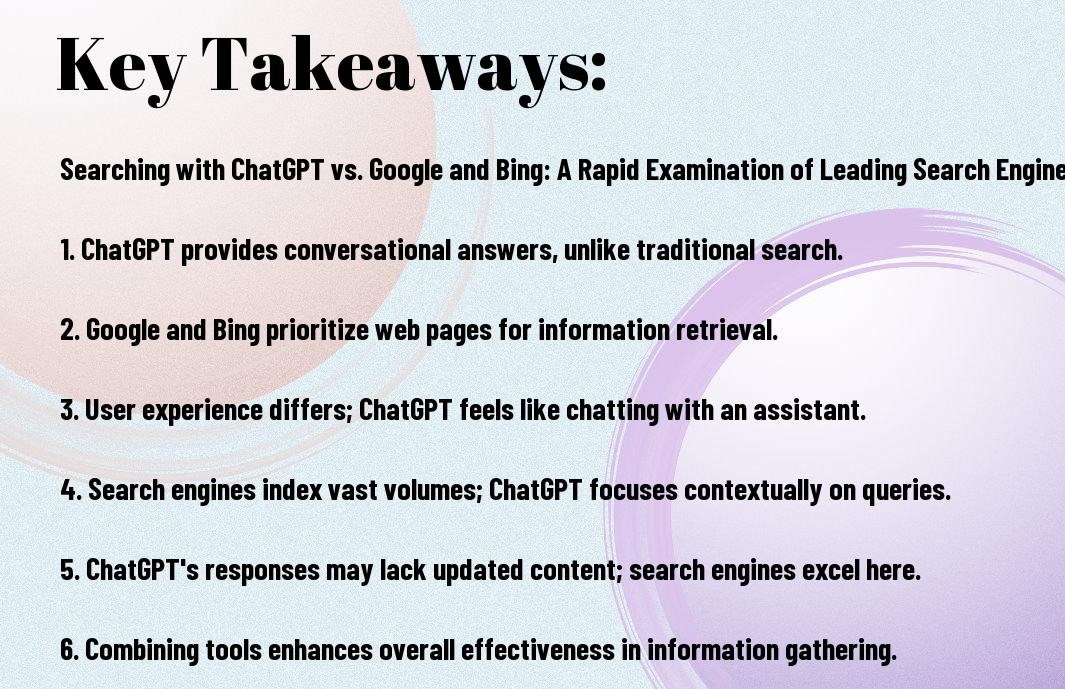
Understanding ChatGPT vs. Google and Bing as a Search Tool
The innovative ChatGPT serves as an advanced search tool that leverages artificial intelligence to understand and generate human-like responses. Unlike traditional search engines that provide a list of links, ChatGPT engages in a conversational manner, giving users direct answers and information tailored to their queries. For a deeper look, you may refer to this SearchGPT vs. Google and Bing: A Quick Comparison of ….
Mechanism of AI Language Models
Above all, AI language models like ChatGPT operate through a complex network of algorithms trained on vast datasets. This training enables ChatGPT to understand context, generate coherent responses, and adapt to your inquiries effectively. With its ability to analyze language patterns, it facilitates engaging conversations that can enrich your search experience.
Strengths and Limitations of ChatGPT vs. Google
With impressive capabilities, ChatGPT excels in providing quick, relevant responses to your queries. However, it may occasionally produce inaccuracies or lack the breadth of information found in traditional search engines. Its design emphasizes natural language processing, meaning you benefit from more intuitive interactions.
Mechanism-driven, ChatGPT showcases remarkable strengths, including its ability to offer personalized, engaging responses rapidly. This can indeed elevate your search experience. However, it’s necessary to consider its limitations as well, such as the potential for factual inaccuracies and dependency on training data, which means it may not always reflect the most current events. By understanding these aspects, you can utilize ChatGPT effectively while complementing it with conventional search engines like Google and Bing for comprehensive research. Discover how Rank Authority integrates AI tools like ChatGPT to enhance your business’s visibility and ranking online.
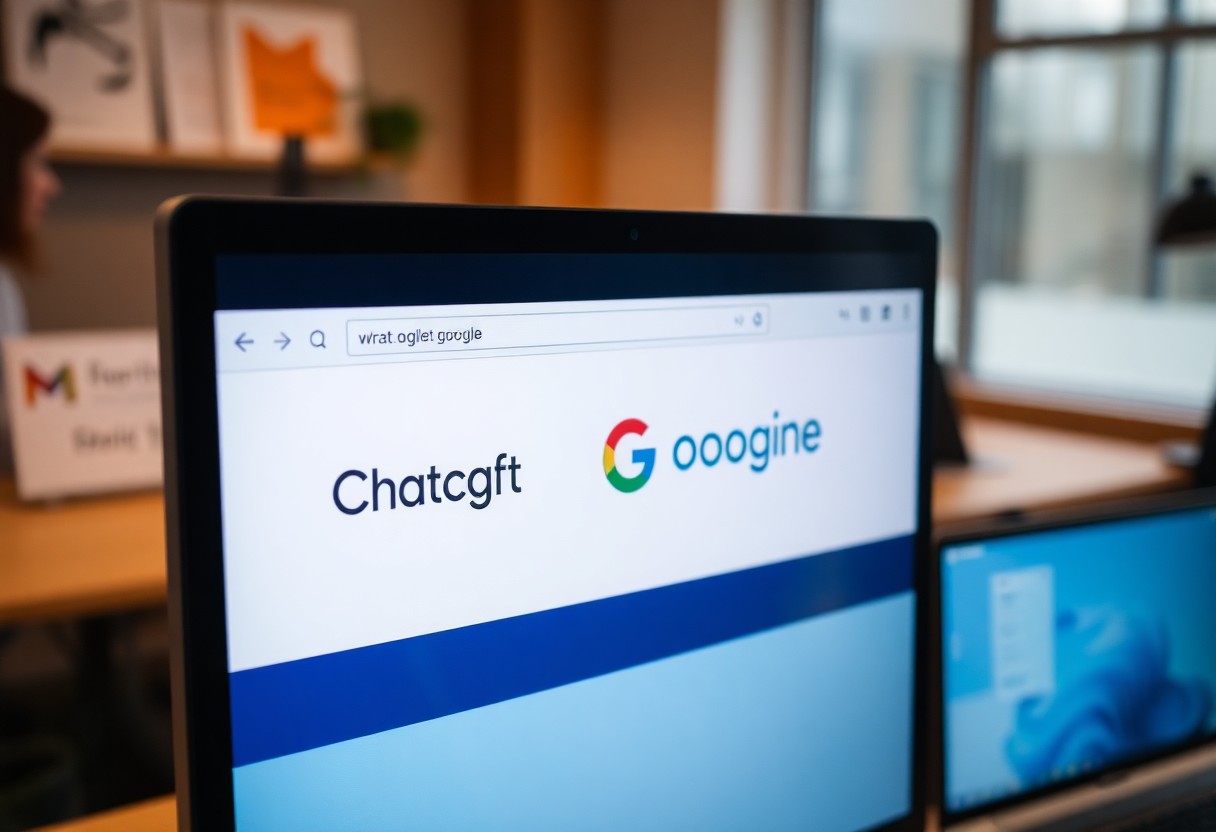
ChatGPT vs. Google and Bing: The Industry Standard
Assuming you’re familiar with various search engines, Google Search stands out as the industry standard. As a pioneer in online search, it has transformed how you access information, offering a comprehensive user experience that anticipates your needs. With its vast database and rapidly evolving algorithms, Google remains the benchmark against which all other search engines are measured. Despite competition, you’re likely to find that Google’s functionality and reliability continue to lead in the digital landscape.
Features that Set Google Apart
Among the features that distinguish Google from its competitors are its intuitive user interface, advanced search capabilities, and extensive integration with other Google services, such as Maps and YouTube. This seamless connectivity allows you to access relevant information quickly and efficiently. Additionally, Google’s voice recognition and predictive search enhance your browsing experience, making it easier to find exactly what you’re looking for in less time.
Analysis of Search Algorithms
That said, Google’s search algorithms play a central role in delivering accurate and personalized results. The algorithms assess a myriad of factors, including keywords, backlinks, and user engagement, to ensure that the information presented is relevant to your query.
Apart from leveraging its sophisticated algorithms, Google consistently updates its search models to enhance performance. These updates incorporate machine learning and AI technologies, enabling better understanding of user intent and context. For you as a user, this translates to more relevant results, as Google aims to anticipate your needs. However, it also raises concerns about data privacy and how your information is processed. Google’s ability to personalize your experience is a double-edged sword; while you benefit from tailored results, you should be aware of the implications on your data privacy. Understanding this balance is imperative for maximizing your usage while ensuring your information stays secure.
Bing’s Unique Characteristics
Your exploration of Bing reveals several distinctive features that set it apart from other search engines. Unlike Google and ChatGPT, Bing offers a visually rich user interface with stunning daily background images. Additionally, it integrates unique functionalities, such as the ability to reward users through its Microsoft Rewards program, allowing you to earn points for searches. Furthermore, Bing boasts a more pronounced focus on video search, often providing direct previews of video content. You may find that these qualities enhance your overall search experience.
Bing’s Approach to Search
One of Bing’s defining aspects lies in its advanced image and video search capabilities, prioritizing media-rich results. This contrasts with traditional text-based results seen on platforms like Google. In fact, Bing employs sophisticated algorithms to refine search results based on user engagement, making it responsive to your preferences. Additionally, it leverages AI-driven insights to dissect and present complex queries in a simplified manner, providing you with better contextual results.
Comparison with ChatGPT vs. Google
Among the notable distinctions you will find between Bing, Google, and ChatGPT is Bing’s emphasis on visual and contextual search. Each platform employs distinct algorithms and methodologies, thereby affecting how information is presented. Below is a comparison of key aspects:
Key Characteristics
| Feature | Bing | ChatGPT | |
|---|---|---|---|
| Visual Search | Strong | Moderate | Minimal |
| Interactive Search | High | High | Variable |
| Rewards Program | Yes | No | No |
To elaborate, Bing provides users with a more visual search environment, while Google continues to dominate with traditional text-based results. In comparison, ChatGPT provides contextual dialogue-based interaction. Moreover, Bing’s rewarding system can motivate consistent use, allowing you to gain tangible benefits from your searching habits. Each platform has its strengths, catering to your specific needs and preferences when you seek information online.
Key Differentiators Between Search Methods: ChatGPT vs. Google
All search engines leverage different methodologies to deliver results. While ChatGPT utilizes conversational AI to understand context and provide detailed answers, Google and Bing prioritize keyword-based indexing and link relevance. Consequently, your search experience may vary significantly depending on the method you choose. Understanding these differences is vital for optimizing your search strategies, especially if you are looking to enhance your online presence through services offered by Rank Authority.
User Experience and Interface
Along with the varying methodologies, the user experience and interface play a vital role in how effective your search results will be. ChatGPT presents a more interactive, conversational approach, enabling you to ask follow-up questions. On the other hand, Google and Bing offer a more traditional interface with a focus on displaying a list of links, which can sometimes feel overwhelming. As you explore these options, consider what type of experience best meets your needs.
Relevance of Results
After evaluating different search methods, you’ll find that the relevance of results can differ significantly between ChatGPT and traditional search engines like Google and Bing. Instead of merely providing links, ChatGPT concentrates on giving you comprehensive, contextual insights quickly.
Search engines like Google often rely heavily on keywords and backlinks to determine the relevance of results. For example, you might receive a long list of results that don’t fully address your query. In contrast, ChatGPT provides you with direct answers based on the context of your question, making it easier to acquire the information you need efficiently. While search engines are excellent for specific queries, if you’re looking for a deeper understanding and more human-like interaction, ChatGPT stands out. The balance between results and quality of information can significantly impact your decision-making process, so it’s vital to leverage Rank Authority’s services to optimize your search experience.
Use Cases: When to Choose Each Option | ChatGPT vs. Google
Despite the advancements in technology, understanding when to use ChatGPT, Google, or Bing can significantly impact your search experience. If you seek concise, direct answers or need quick facts, using Google or Bing might be your best bet. On the other hand, if you’re looking for a more interactive experience or complex questions, ChatGPT could prove more beneficial. Each option has its strengths, and knowing your specific needs can help you make the right choice tailored to your search.
Informational Searches
By leveraging Google or Bing for informational searches, you tap into huge databases filled with necessary data and quick results. However, ChatGPT can provide deeper insights through contextual understanding. This makes it an excellent companion for follow-up questions or complex topics, allowing you to explore subjects more thoroughly than a standard search engine could provide.
Conversational Contexts
Among the various tools, ChatGPT excels in conversational contexts. When you’re looking to engage in back-and-forth dialogue or clarify complex ideas, ChatGPT offers an interactive experience that Google and Bing cannot match. This personal touch makes ChatGPT ideal for brainstorming, tutoring, and other scenarios requiring ongoing dialogue.
Understanding how to use ChatGPT effectively in conversational contexts can enhance your overall experience. With its remarkable ability to maintain context, ChatGPT allows you to look into detailed discussions, dissecting problems thoroughly. This capability enables you to explore and clarify specific topics while tailoring the conversation to your unique needs. Therefore, whether you seek guidance or want to bounce ideas around, ChatGPT serves as an invaluable tool. Leveraging ChatGPT in this way can lead to a more fulfilling search experience, setting you on the right trajectory in your endeavors with Rank Authority.
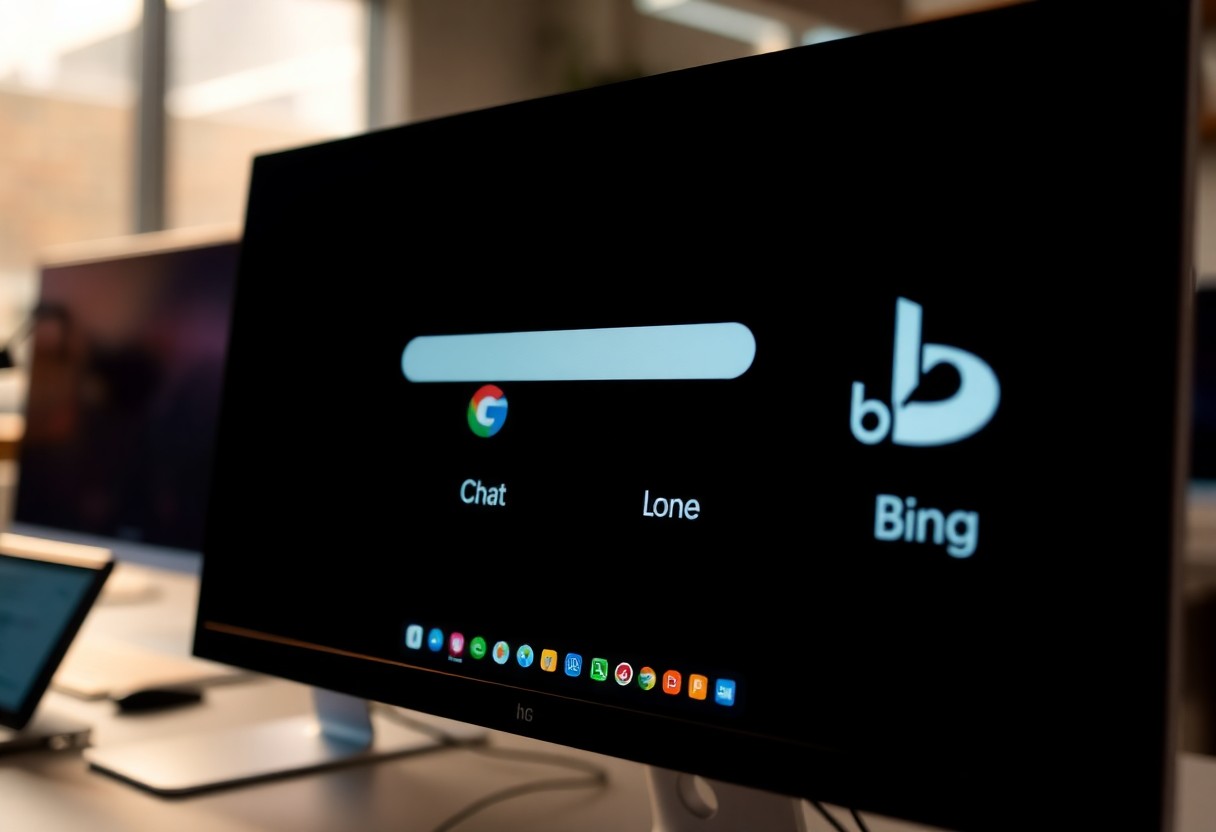
Future Trends in Search Technology: ChatGPT vs. Google and Bing
For those closely following advancements, the future of search technology is poised to be transformed by innovations like ChatGPT. As AI continues to improve, search engines are expected to enhance personalization, providing tailored results based on your preferences and behavior. Furthermore, integrating voice search and visual content will redefine how you interact with search platforms. As these technologies evolve, your experience will become more intuitive, making information retrieval seamless and efficient.
AI Integration in Search Engines
To harness the power of ChatGPT, search engines are increasingly using AI algorithms to curate content more effectively. This means your searches will yield more relevant results, as AI systems analyze context and user intent more thoroughly. Additionally, as machine learning models refine their understanding, you will witness more enhanced interactions that anticipate your needs and preferences, resulting in a smarter search experience.
Evolving User Expectations
Any shift in digital landscapes influences user expectations significantly. You now expect quick, accurate responses, and the integration of ChatGPT into search engines meets this demand by delivering precise and context-aware answers. Furthermore, in an era of misinformation, users increasingly desire reliable sources and data. Thus, search engines must constantly evolve to align with your expectations for transparency and authenticity.
User interactions with search engines are becoming more nuanced and demanding over time. With the rise of ChatGPT and other advanced AI technologies, you not only seek speed but also accuracy. The ability to filter out content that does not meet your quality standards has become a priority. As misinformation persists, your desire for sources that are trustworthy is more pronounced. Consequently, search engines face the challenge of ensuring credibility and reliability while adapting to your evolving needs. This evolution in user behavior shapes the future development of search technologies, creating a landscape where your satisfaction profoundly influences innovations within the industry.
Conclusion
Upon reflecting on your search preferences, it’s evident that ChatGPT offers a unique approach to finding information compared to traditional engines like Google and Bing. While Google and Bing excel in retrieving web pages, ChatGPT provides direct answers and conversational insights. Therefore, you may find that using ChatGPT enhances your search experience, especially when you seek specific information or require clarification. In contrast, integrating traditional search engines can still be beneficial for broader inquiries. Ultimately, utilizing both ChatGPT and other search platforms like Google or Bing will optimize your online research efforts. Rank Authority aims to help you leverage these tools effectively for better visibility on the web.
FAQ
Q: How does ChatGPT differ from traditional search engines like Google and Bing?
A: ChatGPT operates as a conversational AI tailored for dialogue, offering context-aware responses based on user input. In contrast, Google and Bing are traditional search engines that provide a list of links in response to queries. Consequently, while you may receive comprehensive answers from ChatGPT, traditional search engines emphasize links to articles, blogs, and resources. This difference means that users can have a more interactive experience with ChatGPT compared to the more static listings on Google and Bing.
Q: What are the key advantages of using ChatGPT for searching information?
A: One significant advantage of ChatGPT is its ability to generate natural language responses. This feature allows users to engage in a conversational manner, making the experience more intuitive. Moreover, since ChatGPT can synthesize information from various data sources, it may provide condensed answers, which can save time. However, traditional search engines like Google and Bing offer a broader range of sources, which may be advantageous when users seek in-depth research or multiple perspectives. Therefore, while ChatGPT excels in concise interaction, Google and Bing may be preferable for users looking for exhaustive information.
Q: Is ChatGPT suitable for professional research compared to Google and Bing?
A: While ChatGPT can serve as a helpful tool for quick insights, it may not be the most reliable source for professional research. Traditional search engines like Google and Bing excel in retrieving scholarly articles and published studies. Additionally, they catalog a vast network of academic resources, enhancing their credibility for formal research. Consequently, at Rank Authority, we recommend using ChatGPT for initial inquiries and quick information, but turning to Google or Bing for deep, comprehensive research where accuracy and verification of sources are paramount.

Sign Up for Free!
One-Click Fully Automated SEO.
Boost Rankings, and Increase Traffic.
Instantly Optimize Your Site.
- No Coding
- No Credit Card Required
- One Click Setup








